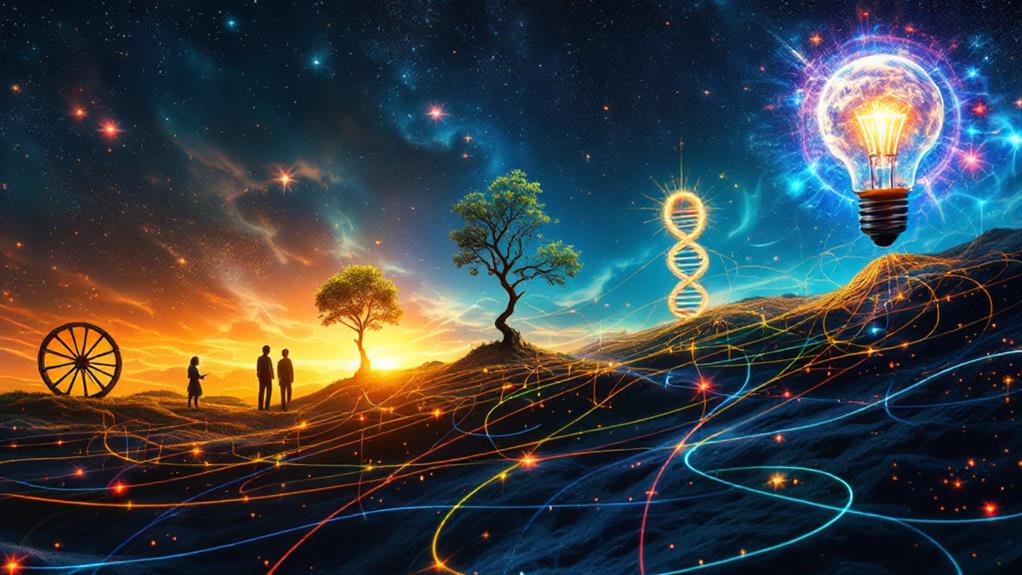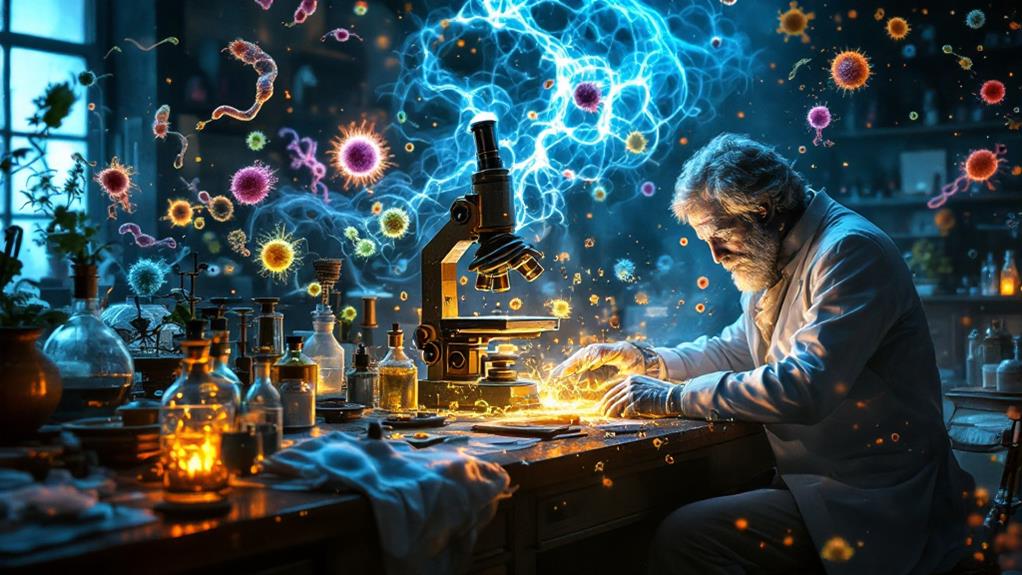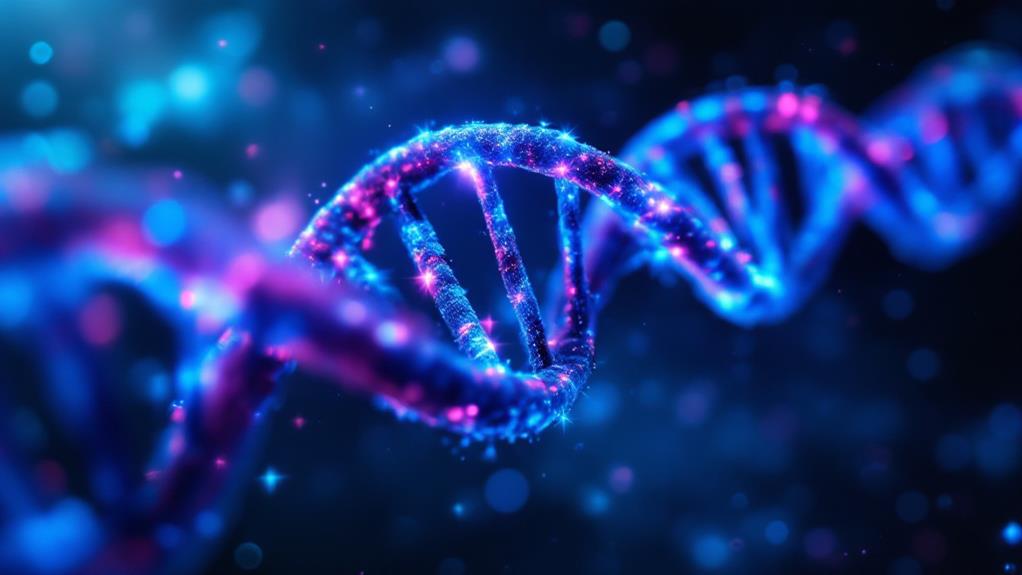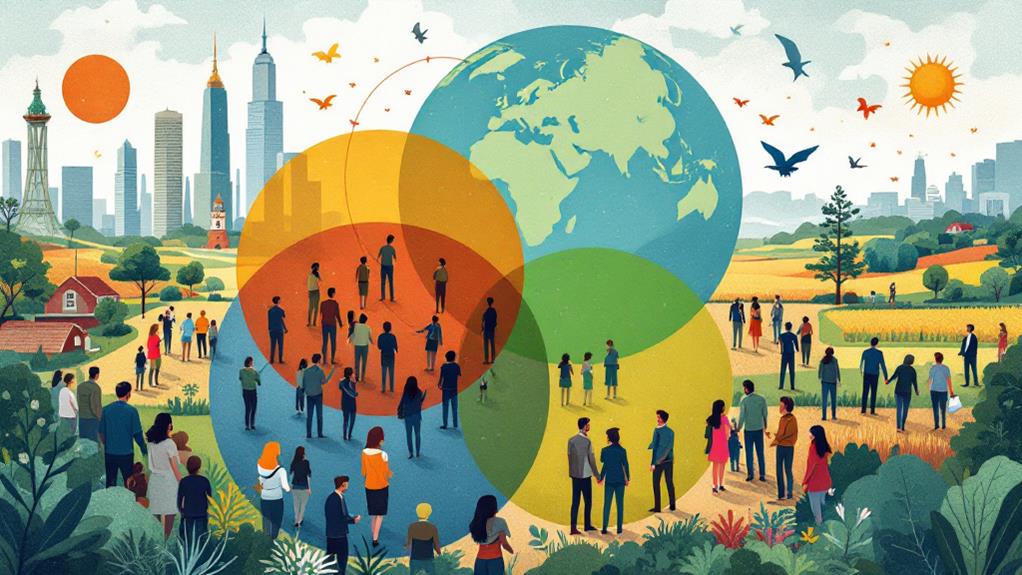10 Discoveries That Changed History: From Science to Civilization

You're about to unveil ten revelations that have dramatically shaped human history. The discovery of fire provided warmth, security, and a social nucleus. The invention of the wheel transformed transportation and trade. The printing press democratized knowledge and ignited the Renaissance. Electricity empowered modern life and sustainable solutions. Germ theory transformed healthcare with antiseptics and vaccines. Penicillin marked a milestone in infection control. Understanding atomic structure led to new energy sources. DNA's double helix revealed the secrets of heredity. Finally, the internet redefined global communication and commerce. Each discovery opened new chapters in our expedition, inviting deeper insights into their impact.
The Discovery of Fire
Among the many revelations that have shaped human history, the revelation of fire stands paramount. Imagine you're an early human, facing harsh conditions, predators, and the darkness of night. Fire's significance becomes immediately clear. It provides warmth, protection, and a means to cook food, drastically improving your diet and health. Its light extends the day, creating opportunities for social interaction and storytelling, fundamental elements of cultural development.
As you adapt to harnessing this powerful element, your life transforms. Fire allows you to inhabit colder regions, expanding your territory and access to resources. This early human adaptation proves essential for survival and evolution. You learn to control fire, using it strategically for hunting, managing landscapes, and even making tools more efficient through techniques like heat-treating stones.
Mastering fire also shapes your community. It fosters cooperation and communication, as tending a fire requires teamwork and planning. You see how it becomes a symbol of your collective identity and progress. Its role in rituals and cooking binds your group together, laying foundations for future civilizations. Fire's significance in your life is undeniable, marking a critical moment in humanity's expedition.
The Wheel's Invention
Picture a simple circular object transforming human progress—the wheel. Imagine you're living in ancient times, where transporting goods and people is an arduous task. Then, suddenly, you see a circular form that can roll smoothly across the ground. This is the wheel, a revolutionary invention that made significant transportation advancements possible. It allowed ancient civilizations to move beyond limitations, facilitating trade and communication over vast distances.
In Mesopotamia, around 3500 BC, the wheel initially emerged, fundamentally altering daily life. It wasn't just about moving faster; it was about efficiency and innovation. You can picture carts and chariots rolling across the landscape, enabling societies to expand and cultures to interact. The wheel didn't just change how goods were transported; it transformed agriculture and warfare, too. You see, plows became more effective, and armies could mobilize quickly, leading to the rise of powerful empires.
The wheel's invention was a catalyst for growth and progress, impacting every aspect of ancient civilizations. Imagine how this simple but profound innovation laid the groundwork for the complex transportation systems we rely on today. Your expedition through history starts here, with the wheel.
The Printing Press

Just as the wheel transformed transportation, another critical invention reshaped the world of knowledge and communication—the printing press. You can't overstate its impact. With its ingenious mechanical design, it changed communication by enabling the mass production of books. This meant information dissemination could occur at a pace and scale never seen before. Suddenly, knowledge accessibility wasn't reserved for the elite; it was a possibility for the masses.
Consider what the printing press achieved:
- Cultural Impact: It sparked the Renaissance, giving rise to new artistic expression and ideas.
- Literacy Expansion: As books became more available, literacy rates soared, empowering individuals with education.
- Economic Transformation: The printing press created new industries and jobs, spurring economic growth and prosperity.
- Social Change: Ideas challenging the status quo spread rapidly, laying the groundwork for revolutions and reforms.
Electricity Unveiled
Electricity, a force of nature harnessed by human ingenuity, transformed every facet of modern life. Imagine a world without lights or computers. You'd be amazed at how electricity became the backbone of modern society. It all starts with electrical conductivity, the property that allows electricity to flow through materials. This revelation enabled inventors and scientists to create circuits that power everything from your smartphone to the refrigerator.
As you investigate deeper, consider how electricity doesn't just power devices; it's also essential for producing renewable energy. Wind turbines and solar panels rely on converting natural forces into electrical power, reducing reliance on fossil fuels and promoting a cleaner planet. Electricity drives innovation in sustainable technology, making green energy more accessible and efficient.
Think about how electricity impacts your daily life. From the moment you wake up, flip a switch, and start your day, you're interacting with a network of electrical systems. These systems keep cities alive with energy, ensuring hospitals, schools, and homes stay functional. So, when you marvel at a brightly lit skyline or charge your electric car, keep in mind that electricity is the silent revolution that powers our world's progress.
Germ Theory of Disease

While electricity illuminates our world, another groundbreaking discovery altered our understanding of health and disease. The germ theory of disease revealed the invisible culprits—microbial pathogens—that were responsible for countless illnesses. Imagine the astonishment when scientists realized that these tiny organisms were the root cause of diseases that had plagued humanity for centuries. This theory transformed medicine and public health forever.
You might wonder how this shifted our daily lives. Here are four profound impacts:
- Sanitation Practices: Once people understood that germs spread disease, sanitation became a priority. Clean water supplies and proper waste disposal became crucial, drastically reducing infections.
- Vaccine Development: With a clearer understanding of microbial pathogens, scientists developed vaccines. These life-saving innovations have eradicated diseases like smallpox and protected millions from polio, measles, and more.
- Improved Medical Treatments: Knowing that pathogens caused infections led to more effective treatments, such as antibiotics, which have saved countless lives.
- Public Health Advancements: The focus shifted to preventing disease outbreaks. Public health campaigns educated communities about hygiene, leading to healthier societies.
In accepting germ theory, you accept a healthier world, where understanding the unseen leads to monumental progress in combating disease.
Evolutionary Theory
Amidst a world of scientific revelations, evolutionary theory stands as a cornerstone of our understanding of life itself. By investigating evolutionary biology, you'll uncover how natural selection drives the diversity of life on Earth. This powerful mechanism relies on genetic variation, where differences within a species influence survival and reproduction. Over time, these slight variations can lead to significant changes, evident through fossil evidence that offers a glimpse into our planet's past.
Adaptive radiation is another fascinating aspect of evolution, where organisms diversify rapidly to fill distinct ecological niches. This process can lead to speciation events, where new species arise, further enriching Earth's biodiversity. As you examine human evolution, you'll see how our ancestors branched out and adapted to different environments, shaping the species we are today.
Penicillin's Discovery

As you ponder the wonders of evolutionary biology, another groundbreaking scientific revelation emerges as a proof of human ingenuity—penicillin. This medical breakthrough, unearthed by Alexander Fleming in 1928, transformed healthcare evolution by greatly reducing deaths from bacterial infections. You might be surprised to learn that this revelation was a result of a laboratory accident, a true example of scientific serendipity. Fleming noticed that fungal cultures had killed off bacteria on a petri dish, leading to the creation of the initial true antibiotic.
Imagine the world before penicillin:
- Deadly bacterial infections: Simple cuts and scrapes often led to life-threatening conditions.
- High mortality rates: Pneumonia, syphilis, and other infections claimed countless lives.
- Limited medical interventions: Doctors could do little more than offer comfort to suffering patients.
- Global health crisis: The lack of effective treatments posed a constant threat to populations worldwide.
Penicillin's revelation paved the way for immense pharmaceutical advancements, altering the landscape of global health. However, it also sparked concerns about antibiotic resistance, a challenge you must consider today. As you reflect on this crucial moment, appreciate how penicillin has shaped modern medicine, saving millions and continuing to impact lives daily.
Atomic Structure Revealed
The revelation of atomic structure marks a vital moment in scientific history, unfastening the mysteries of matter that compose everything around us. You investigate the world of quantum mechanics and particle physics, where atomic models become your guide. Understanding atoms means grasping the roles of subatomic particles like protons, neutrons, and electrons. These particles define the behavior of elements in chemical bonding, dictating how atoms interact.
As you examine further, you uncover isotopic variations, which reveal differences within the same element, affecting its atomic mass and stability. This knowledge expands your view of elements and their applications. Immerse yourself in nuclear reactions, where the core of the atom undergoes transformation, releasing immense energy and highlighting the significance of nuclear power and medicine.
Electron configurations illustrate how electrons occupy orbitals, determining an element's reactivity and properties. By mastering these configurations, you predict how elements will behave in chemical reactions, impacting everything from creating new materials to understanding biological processes. Every insight into atomic structure empowers you to see the universe on a fundamental level, transforming how you perceive and interact with the world.
DNA's Double Helix

Revealing the secrets of life, the revelation of DNA's double helix transformed our understanding of biology and heredity. This groundbreaking finding disclosed the elegant structure of DNA, the molecule carrying the genetic blueprint for all living organisms. You suddenly had a clearer picture of how traits are inherited and how life's instructions are coded.
Imagine the vast impact this breakthrough has had on your world:
- Unlocking Genetic Engineering: You now have the power to manipulate DNA, leading to advancements in medicine, agriculture, and even the potential for eradicating genetic disorders.
- Revolutionizing Forensic Science: The ability to analyze DNA evidence has transformed criminal investigations, helping to solve cold cases and bring justice to victims.
- Understanding Evolution: You can now trace the lineage of species, providing insights into the evolutionary processes that shape life on Earth.
- Personalized Medicine: Tailoring treatments based on individual genetic profiles has become a reality, improving health outcomes and quality of life.
The finding of DNA's double helix didn't just disclose life's blueprint; it opened the door to possibilities that continue to reshape your world, enhancing your understanding of life, identity, and the future.
Internet Revolution
Much like the revelation of DNA's double helix reshaped our understanding of biology, the internet transformation has dramatically transformed how you interact with the world. With a click or a tap, social media connects you to friends and global events instantaneously. Online communication now dominates, making traditional mail seem quaint. Yet, with this connectivity comes the challenge of online privacy, as your data becomes a valuable commodity.
Internet accessibility has also become a cornerstone of modern life, breaking barriers and opening doors to knowledge and opportunities previously unimaginable. Virtual reality offers engaging experiences, blurring the lines between online and physical worlds. The e-commerce evolution has redefined shopping, bringing stores to your fingertips and changing how you buy and sell.
However, these advancements aren't without risks. Cybersecurity threats loom large, requiring vigilance to protect your online footprint. Data analytics drive innovation but also raise questions about who controls your information. Internet governance shapes these online environments, balancing freedom and regulation. Meanwhile, cloud computing provides unprecedented storage and processing power, transforming how businesses operate. The internet transformation isn't just about technology; it's reshaping society itself, influencing every aspect of your daily life.



